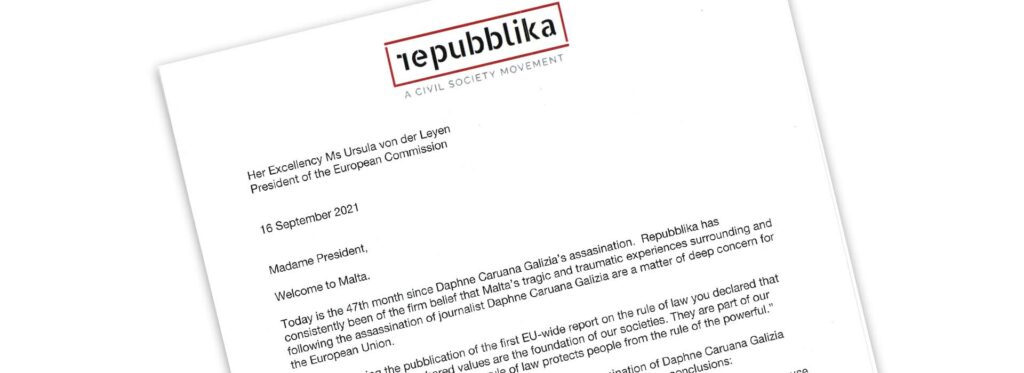Her Excellency Ms Ursula von der Leyen
President of the European Commission
16 September 2021
Madame President,
Welcome to Malta.
Today is the 47th month since Daphne Caruana Galizia’s assassination. Repubblika has consistently been of the firm belief that Malta’s tragic and traumatic experiences surrounding and following the assassination of journalist Daphne Caruana Galizia are a matter of deep concern for the European Union.
Last year, during the publication of the first EU-wide report on the rule of law you declared that “the rule of law and our shared values are the foundation of our societies. They are part of our common identity as Europeans. The rule of law protects people from the rule of the powerful.”
Last month, the findings of the Public Inquiry into the assassination of Daphne Caruana Galizia were published. These findings are chilling; they include the following conclusions:
“[ … ] the State must bear responsibility for the assassination [of Daphne Caruana Galizia] because it created an atmosphere of impunity generated from the highest levels in the heart of the administration within the Office of the Prime Minister that like an octopus spread to other entities, such as regulatory institutions and the police, leading to the collapse of the rule of law and, therefore, (a) the State and the entities that make it up did not recognise as they should have the real and immediate risks, including from the criminal intent of third parties, to Daphne Caruana Galizia’s life; and (b) failed to take measures within the scope of its powers which it was reasonably expected to take to avoid that risk.” (Part VI, Conclusions)
“23. The Board concludes that, given that the crime was necessarily linked to Daphne Caruana Galizia’s serious allegations regarding the public administration which were revealed with more detail when she published her Panama Papers and 17 Black reporting, the Board cannot but review the collective responsibility of the members of the Cabinet1 given they failed to take the required action. [ … ]
- For the Board, this inactivity is inexplicable if not for the fact that the Cabinet was more concerned with the creation of wealth in the hands of a small group of trusted people, some of whom were implicated in the allegations being made, rather than acting to defend those who were at grave risk because they were performing their duty. [ … ]
- Not only did the Government take no action to remedy this situation; the Cabinet and the whole parliamentary group continued to give its support to the implicated individuals through parliamentary votes of confidence.
- For the Board, the Cabinet’s inactivity under the circumstances, which failed as a government to demand action to ensure that the rule of law be respected by choosing to close an eye for the purposes of not losing the wealth that was being created, means that all Ministers individually, one way or another, were subscribing to and endorsing the Prime Minister’s decision to let everything slide. A decision that sent a strong political signal that the sense of impunity that was being created at the heart of the administration had the silent approval, if not the blessing, of the Cabinet in its entirety.” (Part VI, Conclusions).
We are sure that you agree that the development of such a state of affairs in a European Union Member State is a failure for the Union itself.
The impunity for corruption and wrongdoing in Malta has long been exposed and been brought to the attention of the European institutions; however, it is our considered opinion that the European Union failed to sanction it in a timely manner. This failure allowed impunity to grow to such an extent that Daphne was assassinated.
On the other hand, we do recognise the European Union’s support for a thorough investigation of Daphne’s assassination after her murder.
Europe would be failing its citizens if it overlooks this state-of-affairs.
Repubblika believes that the European Union has the responsibility to
- acknowledge its failure in allowing such a situation to develop and take root in a Member State;
- seek to understand the reasons that led to such failure and how its actions and/or inactions led to such failures;
- undertake the necessary measures to prevent the development of similar situations.
We are committed to giving our contribution to the fulfillment of these duties.

Dr. Robert Aquilina
President
1 A member of this Cabinet now sits on the European Commission.





